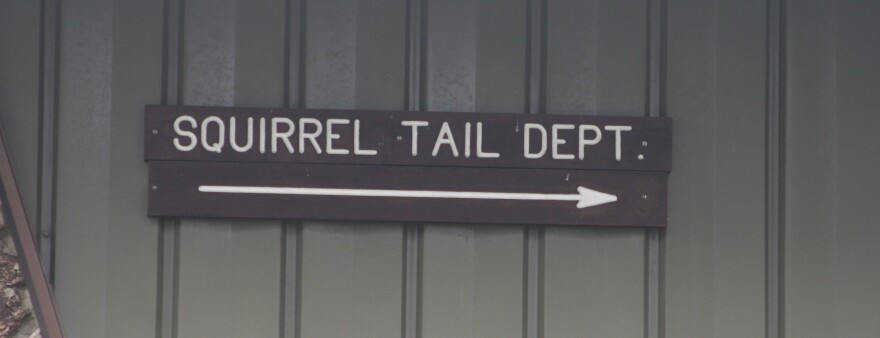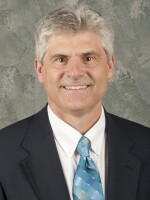We continue our We Live Up Here series this week with a story of a family-owned fishing lure manufacturer in Antigo that uses squirrel tail hair on their famous Mepps spinners.
Jim Skibo has the story.
“Squirrel Tails Wanted,” reads the sign on highway 45 in Antigo. If you have traveled down that road, you might have wondered, like me, who buys squirrel tails? It turns out that squirrel hair is one of the essential pieces of MEPPS spinners, one of the most popular fishing lures in the world. The lures, 3 to 5 million per year, have been made in Antigo since the 1950s by the Sheldon family. Mike Sheldon, current President of the company, says his father, Todd, first became aware of MEPPS spinners shortly after WWII.

According to Mike, a GI came home from France with a few MEPPS spinners, which he passed onto his dad, Todd, who then owned a retail sporting business. He threw them in his tackle box until one day he was out fishing and not having any luck. So he gave the spinners a try and he caught his limit of fish. That prompted the elder Sheldon to start selling his lures in his shop.
By 1956, spinning sales were so good that Todd sold the store and created Sheldon Inc. to focus on importing MEPPS spinners. In 1972 the MEPPS factory in France was up for sale, and Todd Sheldon bought it. The components for the spinners are still made in France, but all the assembly is done right here in Antigo.
Today, Todd is proud of the fact that they still assemble the spinners in Antigo during a time when many of the other manufacturers have moved their operations abroad to take advantage of cheaper labor.
Despite pressures to move the company, both Mike and his father before him believe that the community of Antigo plays a big role in staying.
Mike was born and raised in Antigo and now his two sons work for the company. He believes that Antigo is a great place to not only raise a family but he also passes on the family attitude towards his employees. In fact, most of the employees have been working there over 25 years. Betty Fleischman, their longest tenured employee, just started her 50th year with the company.
As mentioned earlier, a hallmark of the MEPPS spinners is none other than the use of real squirrel hair. This is something that Mike’s father added to the spinners after a fishing trip.

Mike recounts that this father was fishing on the Wolf River and he caught a limit of trout. When walking back to his car he encountered a young boy who was leaving as well. Mike’s father opened his creel and showed off his catch. The young man had caught his limit too and he showed him his catch. All of them were bigger. As fisherman do, Todd asked the young man what he caught them with, and the boy pulled out a MEPPS spinner. On closer inspection, Todd noticed that the boy had tied squirrel hair to the spinner.
Todd Sheldon started tying squirrel hair to the spinners and today the company can use up to 30,000 squirrel tails per year, which are provided by hunters across the United States.

Cindy Kielman, who has been at Sheldon’s for 32 years, works in the Squirrel Department, where she receives hundreds of tails daily.
After she washes and dries the tails, she ties a small tuft of hair to a hook before it moves onto the floor where the rest of the spinner is assembled.
On the floor, Rosella Spencer says she assembles twelve to fifteen hundred spinners per day, where she attaches the hook to the body of the spinner and passes it through a machine that makes the connection.
The spinners then are packaged, using the only robot in the plant, and moved to shipping where online orders are filled for individual anglers or the giant retailers like Cabela’s or Bass Pro Shops.
The MEPPS spinners are unique in that they don’t look like anything that a fish may want to eat like a worm or a minnow. Mike Sheldon explains that spinner movement, color and sound entice fish to attack in the same way a cat grabs a rolling ball of yarn.
That may be why fish are attracted to spinners, but why are so many people attracted to fishing? Nik Kolbeck is the communication director at Sheldon’s and he tells us that he thinks being with family is the biggest attraction of fishing. He often fishes with his brother and father, and each time they not only may catch a few fish but also spend some great time together.
Mike Sheldon thinks that people always seem to enjoy themselves when fishing. Mike’s dad would always tell him, “I may be known for selling fishing lures but what I really sell is fun.”
The late John Voelker, former Michigan Supreme Court Judge, author, UP resident and avid fisherman shares the same feeling in the final line of “The Testament of a Fisherman":
I fish because I love to; … not because I regard fishing as being so terribly important but because I suspect that so many of the other concerns of people are equally unimportant – and not nearly so much fun.
For more information on Mepps spinners and their squirrel tail program, check out their website: https://www.mepps.com
This story was written by Jim Skibo and produced for radio by Mackenzie Martin. Music for this story came from Blue Dot Sessions: Gambrel by Blue Dot Sessions (www.sessions.blue).
This story was funded in part by a grant from the Wisconsin Humanities Council, with funds from the National Endowment for the Humanities and the State of Wisconsin. Any views, findings, conclusions or recommendations expressed in this project do not necessarily represent those of the National Endowment for the Humanities. The Wisconsin Humanities Council supports and creates programs that use history, culture, and discussion to strengthen community life for everyone in Wisconsin.









